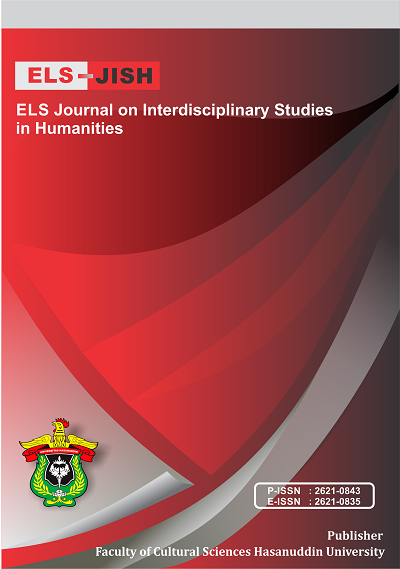Linguistic Code Mixing: A Study of an Australian YouTuber
DOI:
https://doi.org/10.34050/elsjish.v6i3.28411Keywords:
Code Mixing, Damian Hoo, Sociolinguistics, YouTubeAbstract
Mixing one language to another languages in sociolinguistics is called code mixing. It happens in one of the Australian Youtuber, Damian Hoo, who currently living in Indonesia. Therefore, this research discussed about the types and functions of code mixing produced by Australian Youtuber, Damian Hoo, based on Hoffman’s (1991) theory. This research applied descriptive qualitative method. In collecting the data, the researchers applied documentation method. The result of the research revealed that there are two types produced by Damian Hoo in his YouTube channel, namely intra-sentential code mixing with 55 data and involving a change of pronunciation with only 2 data. For the functions of code mixing, there are six functions of code mixing which are used by Damian Hoo, such as talking about a particular topic as the highest number for function with 25 data, being emphatic about something with 10 data, interjection with 3 data, repetition used for clarification with 6 data, intention of clarifying the speech content for the interlocutor with 12 data, and the last expressing group identity with only 1 data which makes this function is the less used function of code mixing. And the researchers did not find any data of the intra-lexical code mixing and function for quoting somebody else.
References
Berg, B. L. (2001). Qualitative research methods for the social sciences. Allyn & Bacon. Boston. 35-36.
Creswell, J. W. (2018). Research Design: Qualitative, Quantitative, and Mixed Methods Approaches (5th Ed.). Los Angeles: SAGE Publication Inc.
Ensour, H. S. (2015). The Effect of Using YouTube on Youth Worst and Best Case. Current Journal of Applied Science and Technology, 8(3), 286–304.
Gay, L.R., Mills, G.E. & Airasian, P.W. (2012). Educational Research: Competencies for Analysis and Application. 10th Edition, Pearson, Upper Saddle River.
Hoffman, C. (1991). An Introduction to Bilingualism. New York: Routledge Tailor and Francis Group.
Hudson, R. A. (2001). Sociolinguistics (2nd ed.). Cambridge Textbooks in Linguistics, Cambridge: Cambridge University.
Hutabarat, I., & Khalisa, L. (2020). Code Mixing Used By Teenagers In Facebook. Jurnal Littera: Fakultas Sastra Darma Agung, 1(1), 9-18. Retrieved from https://jurnal.darmaagung.ac.id/index.php/littera/article/view/549
Jaya, I.W.K., Amrullah, & Thohir, L. (2020). A Code Mixing Used By Lecturer and Student In Teaching and Learning Process at YouTube Videos. Jurnal Lisdaya, 16(1), 12-19. Retrieved from https://lisdaya.unram.ac.id/index.php/lisdaya/article/view/12
Kamariah, & Ambalegin. (2019). Analysis of Using Code Switching in Instagram. Journal Basis UPB. doi: https://doi.org/10.33884/basisupb.v6i2.1431
Mokibelo, E. (2015). Multingualism and Multiculturalism in the Education System and Society of Botswana. US-China Education Review B. Vol. 5(8): pp 448-502.
Sugiyono. (2013). Metode Penelitian Kuantitatif, Kualitatif, dan R&D. Bandung Alfabeta.
Sutrisno, B & Ariesta, Y. (2019). Beyond the use of Code Mixing by Social Media Influencers in Instagram. Advances in Language and Literary Studies. Vol.10, i.6. Indonesia: Sekolah Tinggi Bahasa Asing – IEC Jakarta & Sekolah Tinggi Bahasa Asing – IEC Bekasi.
Wardhaugh, R. (1998). An Introduction to Sociolinguistics. Massachusets: Blackwell publisher Inc.
Wardhaugh, R., & Fuller, J. M. (2015). An Introduction to Sociolinguistics - Seventh Edition.
Downloads
Published
How to Cite
Issue
Section
License
Copyright (c) 2023 Serliah Nur, Muh. Taufik, Sakina Al Munawara

This work is licensed under a Creative Commons Attribution-ShareAlike 4.0 International License.






